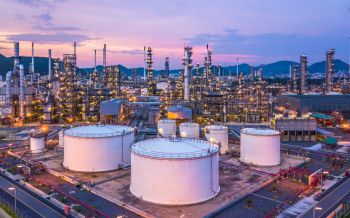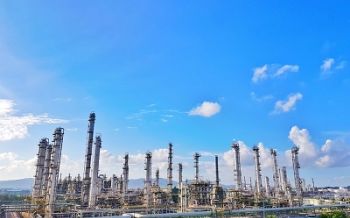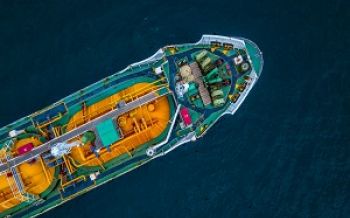The oil and gas industry is pinning its hopes for future demand growth on an expansion of plastic production capacity that is at high risk of being rendered redundant as governments seek regulatory solutions to emissions and ocean pollution problems. The ‘war on plastic’ and impact of Covid-19 may have caused demand for virgin plastic feedstock to peak in 2019, which would mean up to USD 400 billion in planned investment in petrochemicals capacity will be stranded by 2024, influential financial think tank Carbon Tracker warned in a report today.
The outlook for plastics is highly relevant to the natural gas industry, since the feedstock driving supply growth for plastics is natural gas liquids (NGLs), mainly ethane and propane. NGLs make up a large proportion of the global oil supply growth forecast to happen over 2020-40 – some 5 million barrels/d of the anticipated 7 million barrels/d supply growth, according to the BP Energy Outlook 2019.
This 5 million barrels/d of new NGL supply “almost perfectly matches the expected 5.8 mbpd of plastics demand growth expected by BP in the period to 2040,” Carbon Tracker said in its report, entitled The Future’s Not in Plastics: Why plastics demand won’t rescue the oil sector.
“The reason that this matters is that plastics demand growth, even if it should materialise, will drive NGL demand not oil demand. The largest component of oil demand growth is not therefore in fact for oil at all.”
Overcapacity in the upstream petrochemicals sector is already growing, with total capacity in 2019 for ethylene and propylene production at 311 mt versus demand of 272 mt, implying overcapacity of 39 mt. Total capacity for these two key intermediary chemicals is planned to increase by around 80 mt out to 2024.
At an estimated capital cost of USD 5,000 per tonne, the petrochemical industry had already invested around USD 200 billion in upstream plastic production capacity that was greater than demand in 2019, the report states.
“The intention is to invest a further [USD] $400bn (80 mt times $5,000 per tonne) in additional upstream plastics capacity in the next five years to 2024 [into] a market where demand has been damaged by COVID and which faces additional threats … from technology and policy,” it states.
The implication of structural overcapacity is prolonged depressed prices, with ethylene prices at the start of this year already at their lowest since 2003.
“This will lead to stranded assets as the companies at the top end of the cost curve have to close down. But it will also lead to much lower returns across the plastics complex as even low cost companies see a significant fall in profitability,” Carbon Tracker said.
This will mean that the “huge amounts” of new capacity constructed over the last few years will not earn the returns that were expected, and future investments carry high risks of falling short of promises too.
Short term gains, long term pains
In the immediate term, plastics lobbyists have been able to overturn plastic bag bans and to trumpet the benefits of personal protective equipment (PPE). Also, waste systems are in “disarray” and the low price of oil has meant that virgin plastic is cheaper than recycled plastic – all of which is supporting near-term demand.
However, in the longer term, Covid-19 “is likely to speed up change”. Sales of cars – which use much more plastic than PPE – have slumped. Taxing plastic is popular and raises useful revenues at a time of “fiscal stress”. And the pandemic has widened the “Overton window of opportunity” for political change.
The think tank sees the “plastic problem” resembling the “fossil fuel electricity problem” 15 years ago.
Policymakers in 2005 were keen to decarbonise electricity, but solutions at the time were expensive and seemed unfeasibly difficult. Wind power cost more than USD 100/MWh, solar PV cost more than USD 400/MWh and grid operators argued that these sources could never supply more than 2% of the system.
“The situation looked hopeless until it was solved by a combination of regulatory pressure and technological innovation,” the report says. Today, offshore wind farms are being financed with tariffs below the wholesale power price, and Portugal last week completed a power auction that yielded the world’s lowest solar PV tariff of just USD 13.20/MWh.
The report recommended investors factor in continued low prices and weak demand for key petrochemical feedstocks for the foreseeable future, lower oil prices, higher levels of risk and plastic taxation, higher clean-up costs and “[s]ector restructuring as weaker players are unable to survive a more rigorous environment”. - SK
Subscription Benefits
Our three titles – LNG Business Review, Gas Matters and Gas Matters Today – tackle the biggest questions on global developments and major industry trends through a mixture of news, profiles and analysis.
LNG Business Review
LNG Business Review seeks to discover new truths about today’s LNG industry. It strives to widen market players’ scope of reference by actively engaging with events, offering new perspectives while challenging existing ones, and never shying away from being a platform for debate.
Gas Matters
Gas Matters digs deep into the stories of today, keeping the challenges of tomorrow in its sights. Weekly features and interviews, informed by unrivalled in-house expertise, offer a fresh perspective on events as well as thoughtful, intelligent analysis that dares to challenge the status quo.
Gas Matters Today
Gas Matters Today cuts through the bluster of online news and views to offer trustworthy, informed perspectives on major events shaping the gas and LNG industries. This daily news service provides unparalleled insight by drawing on the collective knowledge of in-house reporters, specialist contributors and extensive archive to go beyond the headlines, making it essential reading for gas industry professionals.





